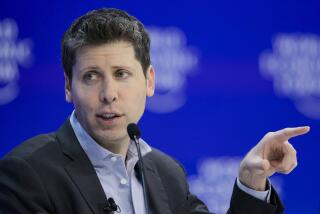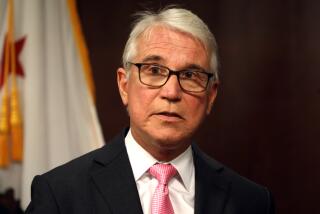Confidential Probe Letter Questioned
- Share via
A San Diego corporation facing possible indictment for defrauding the government has appealed directly to U.S. Atty. Gen. Dick Thornburgh, prompting a flurry of questions about the appearance of improper high-level influence peddling at the Department of Justice.
But U.S. Atty. William Braniff on Monday denied that the corporation’s appeal, made by former secretary of defense Melvin R. Laird, had derailed a possible indictment of Science Applications International Corp., or SAIC.
“The implication that this letter that was written by Laird had any impact or is having any impact on this investigation is totally erroneous,” Braniff said. “An indictment is still under consideration. . . . It hasn’t been killed.”
The U.S. attorney’s office in San Diego began investigating allegations of fraud three years ago at SAIC, an employee-owned defense electronics and contract research firm that does hundreds of millions of dollars of work for the U.S. government each year.
Last November, three former employees of SAIC’s Environmental Chemistry Laboratory in La Jolla pleaded guilty to falsifying testing of soil samples from Superfund toxic waste sites and backdating some test results, overcharging the government about $100,000. Three more employees would later plead guilty.
At the time, Braniff said it was unclear whether the corporation itself would be indicted, since it had participated in the Justice Department’s voluntary disclosure program, under which companies are encouraged to inform the government about wrongdoing they uncover.
But last week, Sen. Charles E. Grassley of Iowa, the ranking Republican on the Senate Judiciary Committee’s subcommittee on courts, wrote Thornburgh to air his concerns that “undue political pressure” might be involved in delaying a possible indictment.
Grassley referred specifically to a letter from Laird, marked “PERSONAL” and hand-delivered to Thornburgh on Oct. 16, 1990, just weeks before the first SAIC employees pleaded guilty.
In the letter, made public Monday by the Project on Government Procurement, a Washington-based nonprofit group that monitors government spending, Laird identified himself as a member of SAIC’s board of directors and gave his personal assurance that the company had done no wrong.
“I would like to ask for the support and understanding of the Justice Department, as I can assure you there was no wrongdoing on the part of the corporation . . .,” Laird wrote, adding that any criminal prosecution of SAIC would be “entirely inappropriate.”
In an addendum to the letter, delivered the same day, Laird noted that President Bush had recently appointed three of SAIC’s board members to his new six-member Foreign Intelligence Board--an aside that apparently caught Grassley’s eye.
Grassley wrote to Thornburgh: “It is not my intention to conclude that Mr. Laird’s references to the presidential appointees were attempts to influence your prosecutorial discretion. However, there is a concern I have about the appearance that is suggested by such references . . . .”
On Monday, Charles Nichols, an SAIC spokesman, defended Laird’s actions on behalf of the company.
“I sure don’t think it improper,” Nichols said. “But Mr. Laird really should answer his own questions on that score.”
Laird could not be reached for comment Monday.
Nichols said it is routine to involve Washington Department of Justice officials in cases related to the voluntary disclosure program.
Braniff agreed, saying that complications surrounding the voluntary disclosure program prompted him to involve Justice Department officials in the case “six months to a year” before Laird’s letter was delivered.
“There’s no question that there are individuals (at SAIC) that have been charged. By vicarious liability, one could argue that the corporation is also liable,” he said. “But that’s a policy issue. I thought, because of the complexity of those issues, the Justice Department should be involved.”
Under the voluntary disclosure program, he said, “You have to kind of thrash it out what is required of people and, when they don’t quite meet it, what (are) the consequences. . . .”
Still, he said, a decision on whether or not to indict SAIC will probably be made soon.
The final decision on whether to prosecute will be made by Robert S. Mueller III, assistant attorney general in charge of the criminal division, according to Doug Tillett, a spokesman for the Department of Justice’s criminal division.
Wallace reported from San Diego and Ostrow from Washington.
More to Read
Sign up for Essential California
The most important California stories and recommendations in your inbox every morning.
You may occasionally receive promotional content from the Los Angeles Times.













